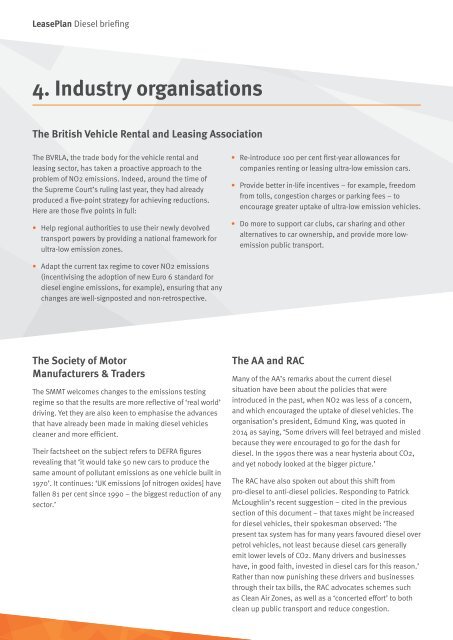You also want an ePaper? Increase the reach of your titles
YUMPU automatically turns print PDFs into web optimized ePapers that Google loves.
LeasePlan <strong>Diesel</strong> <strong>briefing</strong><br />
4. Industry organisations<br />
The British Vehicle Rental and Leasing Association<br />
The BVRLA, the trade body for the vehicle rental and<br />
leasing sector, has taken a proactive approach to the<br />
problem of NO2 emissions. Indeed, around the time of<br />
the Supreme Court’s ruling last year, they had already<br />
produced a five-point strategy for achieving reductions.<br />
Here are those five points in full:<br />
• Help regional authorities to use their newly devolved<br />
transport powers by providing a national framework for<br />
ultra-low emission zones.<br />
• Re-introduce 100 per cent first-year allowances for<br />
companies renting or leasing ultra-low emission cars.<br />
• Provide better in-life incentives – for example, freedom<br />
from tolls, congestion charges or parking fees – to<br />
encourage greater uptake of ultra-low emission vehicles.<br />
• Do more to support car clubs, car sharing and other<br />
alternatives to car ownership, and provide more lowemission<br />
public transport.<br />
• Adapt the current tax regime to cover NO2 emissions<br />
(incentivising the adoption of new Euro 6 standard for<br />
diesel engine emissions, for example), ensuring that any<br />
changes are well-signposted and non-retrospective.<br />
The Society of Motor<br />
Manufacturers & Traders<br />
The SMMT welcomes changes to the emissions testing<br />
regime so that the results are more reflective of ‘real world’<br />
driving. Yet they are also keen to emphasise the advances<br />
that have already been made in making diesel vehicles<br />
cleaner and more efficient.<br />
Their factsheet on the subject refers to DEFRA figures<br />
revealing that ‘it would take 50 new cars to produce the<br />
same amount of pollutant emissions as one vehicle built in<br />
1970’. It continues: ‘UK emissions [of nitrogen oxides] have<br />
fallen 81 per cent since 1990 – the biggest reduction of any<br />
sector.’<br />
The AA and RAC<br />
Many of the AA’s remarks about the current diesel<br />
situation have been about the policies that were<br />
introduced in the past, when NO2 was less of a concern,<br />
and which encouraged the uptake of diesel vehicles. The<br />
organisation’s president, Edmund King, was quoted in<br />
2014 as saying, ‘Some drivers will feel betrayed and misled<br />
because they were encouraged to go for the dash for<br />
diesel. In the 1990s there was a near hysteria about CO2,<br />
and yet nobody looked at the bigger picture.’<br />
The RAC have also spoken out about this shift from<br />
pro-diesel to anti-diesel policies. Responding to Patrick<br />
McLoughlin’s recent suggestion – cited in the previous<br />
section of this document – that taxes might be increased<br />
for diesel vehicles, their spokesman observed: ‘The<br />
present tax system has for many years favoured diesel over<br />
petrol vehicles, not least because diesel cars generally<br />
emit lower levels of CO2. Many drivers and businesses<br />
have, in good faith, invested in diesel cars for this reason.’<br />
Rather than now punishing these drivers and businesses<br />
through their tax bills, the RAC advocates schemes such<br />
as Clean Air Zones, as well as a ‘concerted effort’ to both<br />
clean up public transport and reduce congestion.


